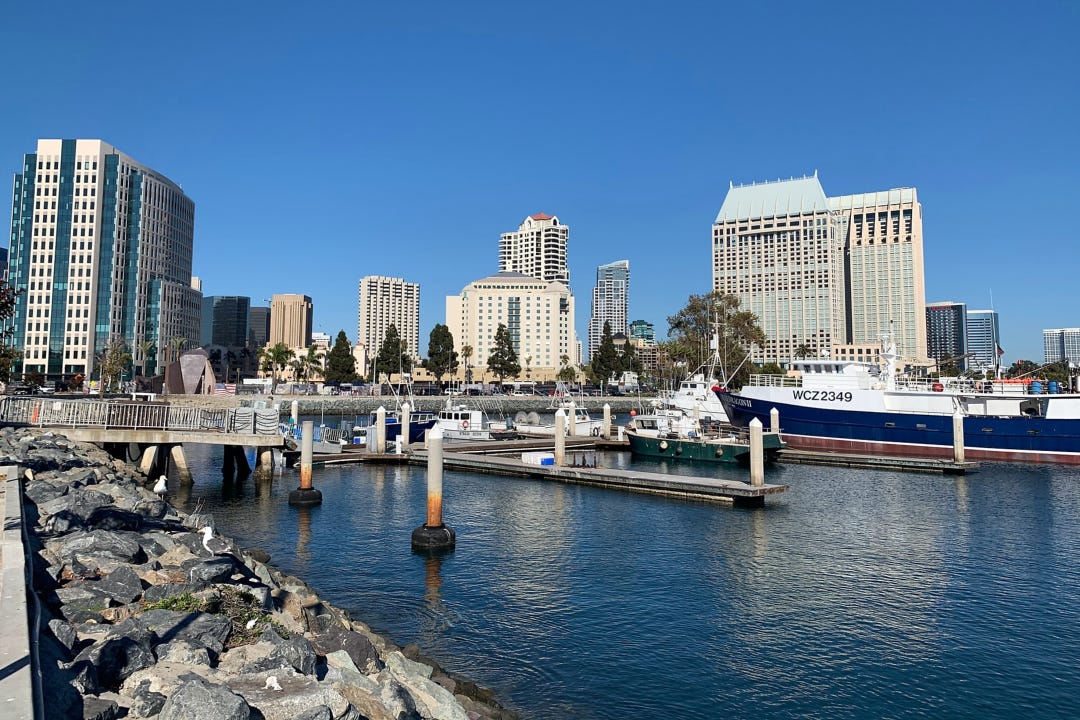Welcome to this series of articles where I explore how I, as a white person, learn about racism and about my own blind spots when it comes to my own racism and prejudice. If you like this weekly newsletter, why not subscribe? I would really appreciate it if you clicked the little purple button below.

An acquaintance of mine called one-day last week and invited me to lunch. This is a guy I have worked with over the years, and we have a casual way about our friendship. He had helped me set up and run a non-profit group for local filmmakers. He was an electronics engineer up until his retirement about ten years ago. He took on a larger role in the non-profit as I dialed back my involvement in the group. We did some cool stuff back in the day, and we still enjoy trading stories over a sandwich and chips.
Seafood is our go-to choice since we are both staying away from land-based animal proteins. So we met at the harbor where the fishing boats come in and off-load their haul. There isn't much local commercial fishing done here anymore since it has moved to floating-factories at sea. Nonetheless, there is still some fresh fish here, and the harbor is the place to find it. We took our to-go orders over to the park and found an empty bench that looked out over the port.
We talked a little bit about politics. Working mostly around the edges of the topic, since we share liberal points of view but don't mesh on everything. Immigration came up as it often does since we live in a border town. I commented that maybe now we could get the asylum process straightened out and start admitting refugees again. Without missing a beat, my friend said something like, "Well, we can't just admit everyone to the U.S. and have the whole world coming here."
The comment caught me flatfooted. I responded with a weak "well yea, no not that." This is typical of how a conversation between two white guys goes when it comes to race. One guy makes a casual statement. The other guy responds with a thinly veiled but totally typical and racist argument for why things are the way they are.
"We can't just have everyone coming here. It will ruin the country, and then what?"
I don't hold anything against my friend. I mean, yea, he's ignorant about racism. He doesn't know that what we have been told for a hundred years, or more, is a story that falsely justifies why a bunch of white people, originally from Europe, get to tell everyone else here what to do. It is the narrative that my friend and I literally grew up with. It has been with us for decades. He's thinking is not right because he has been fed the white man's cool-aid. And it's easy for him to go along with it. The story aids his continued privilege.
On looking back, my flat-footedness in this situation was my blind spot. I think about all the things I should have said instead of a lame "well yea, no not that." There will be a next time when this topic comes up. When I get the thinly-veiled falsely-justified response. So how will I handle it?
It seems that the best chance of bringing some light to the situation would be to put my friend in the shoes of a refugee. I could turn the situation around by asking, "What would you think if you were the one fleeing persecution and seeking asylum in the U.S.?" or "If you lived in a country where everyday life was a matter of just surviving, would you just stay there?"
This is difficult to parse out. I know that I won't change anyone's mind by pointing out all the injustices in the world. The likely response would be "not my problem." What I am looking for, it seems, is a little soft spot where I can draw out some compassion. It's tricky, though, to poke around someone's subconscious and try to find that place where someone doesn't become defensive but instead becomes compassionate.
When there is a next time, and there will be a "next time," I want to be prepared and ready with a better response than I had on that day last week. What are your thoughts on this? How would you respond to conditioned racism like this? Culturally conditioned racism is hard to detect for us white people. Sadly, most of us don't even know how racist we can be and not even know it. If you have any ideas, please leave a comment.
And what else did I miss? Did you notice a blind spot in my story that I missed? I would appreciate it if you would let me know. Comments are now open.
Thank you so much for reading,
Martin
If you would like to subscribe to this weekly newsletter, here is the purple subscribe button



Culturally conditioned racism is not just a white issue. I have experienced cultural racism from black, asian, hispanic cultures and from those of other religions ... but you made me ponder and I guess I have dealt with responses such as your friend's by always asking, "What do you mean?" Because I am truly curious what compelled his statement... my response has elicited fuller conversations and more often his type of response would be then be viewed as culturally conditioned statement... more of a selfish lack of desire to share our bounties.. which is a perfect seque into your idea of conversationally placing him into the fleeing person's footsteps... very thoughtful post, made me think